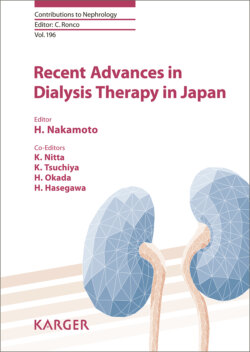Читать книгу Recent Advances in Dialysis Therapy in Japan - Группа авторов - Страница 90
На сайте Литреса книга снята с продажи.
Hypoglycemia
ОглавлениеIf a dialysis patient using insulin has a blood glucose level of less than 60 mg/dL at the start of hemodialysis, urgent blood glucose correction is required. In addition, even if the blood glucose level at the start is 60 mg/dL or more, when an obvious hypoglycemic symptom is observed, urgent treatment is necessary [2]. Signs and symptoms of hypoglycemia include those that appear early due to the autonomic nervous response and those that appear later due to central nervous response. Autonomic nervous system signs and symptoms are caused by secretion of catecholamines from the sympathetic nervous system in response to hypoglycemia, such as cold sweats, palpitations, finger tremor, and feelings of intense hunger. If hypoglycemia is not treated promptly or worsens, signs and symptoms may develop due to glucose deprivation in the central nervous system, such as headache, abnormal behavior, cramping, decreased level of consciousness, coma. Because autonomic nervous system disorders are common in hemodialysis patients with diabetes, even if hypoglycemia occurs, it may not exhibit the above autonomic nervous signs and symptoms, and the hypoglycemic condition may be prolonged. Furthermore, even when hypoglycemia occurs, secretion of an insulin-antagonistic hormone such as glucagon is often lower than normal, so that a sudden reduction in consciousness (hypoglycemia unawareness) may occur. Diabetes patients on dialysis receiving diabetes medication are considered to have a high risk of developing hypoglycemia, and when a rapid consciousness disturbance occurs in the patient, it is necessary to promptly assess the blood glucose level to check for hypoglycemia. Then, if hypoglycemia is present, blood glucose should be corrected immediately and followed closely, as hypoglycemia may recur.
